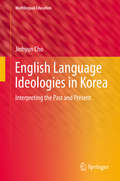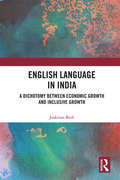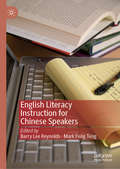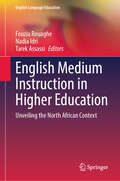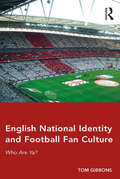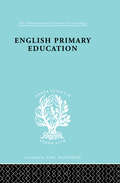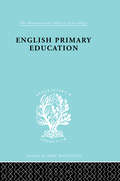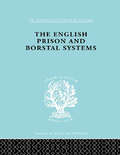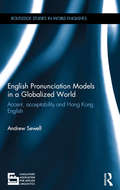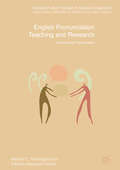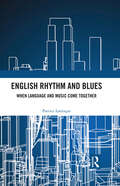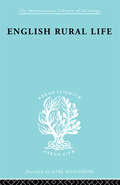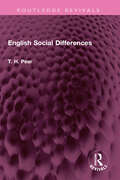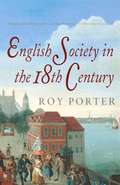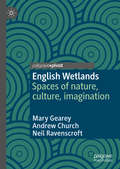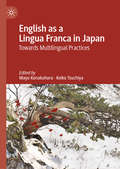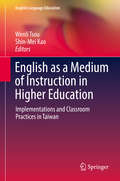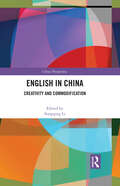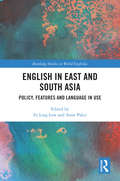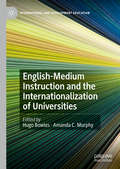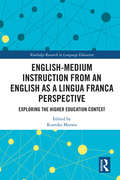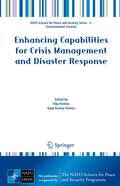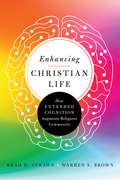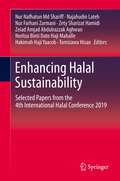- Table View
- List View
English Language Ideologies in Korea
by Jinhyun ChoThis volume critically examines the phenomenon of "English fever" in South Korea from both micro- and macro-perspectives. Drawing on original research and rich illustrative examples, the book investigates two key questions: why is English so popular in Korea, and why is there such a gap between the 'dreams' and 'realities' associated with English in Korea? These questions are explored through the eyes of English-Korean translators and interpreters, who represent the professional group most intensely engaged in the zeal for English language mastery. Macro-perspectives focus on historical factors leading to the rise of English, with English-Korean translation and interpreting as a key theme. Micro-perspectives explore the dreams that individuals attach to English and the ways in which they imagine it can transform their lives, and contrast these dreams with the stark realities felt on the ground. The gaps between these dreams and realities are explored from various angles, which include commodification, gender and neoliberalism. The book thus offers fresh insights on how the phenomenon of "English fever" has been created, reproduced, and sustained from both historical and contemporary viewpoints.
English Language and General Studies Education in the United Arab Emirates: Theoretical, Empirical and Practical Perspectives (English Language Teaching: Theory, Research and Pedagogy)
by Christine Coombe Georgia Daleure Lana HiasatThis book presents an up-to-date account of current English-language English teaching and General Studies practices in the UAE. The chapters, written by leading language teacher educators, feature theoretical and empirical aspects of teaching, learning, assessment as well as related research. Throughout the book, the link between theory and practice is highlighted and exemplified. This reader-friendly book is suitable for undergraduate and graduate students, teachers, researchers and administrators of English language and general studies programs in the UAE and beyond who wish to keep abreast of recent developments in the field.
English Language in India: A Dichotomy between Economic Growth and Inclusive Growth
by Jaskiran BediThis book examines the relationship between the English language and growth – economic and inclusive – in India. It explores why English continues to be the language of aspiration long after Independence. With the second largest English-speaking population in the world today, India is testimonial to how a linguistic legacy continues to cast a long shadow on its contemporary discourse in the economic arena. The volume: Explores how English language proficiency constitutes as human capital. Draws in the latest India Human Development Survey data. Investigates the relationship between the language and economic indicators such as wages, household income and state growth. Purther investigates the role of English language in the inclusivity of growth. Provides a snapshot of the pedagogy of English in the Indian education system. First of its kind in scope, this volume will be of great interest to scholars of economics, education, sociolinguistics, development studies, politics and sociology. It will also be of great interest to the general reader.
English Literacy Instruction for Chinese Speakers
by Mark Feng Teng Barry Lee ReynoldsWritten with an emphasis on instruction, policy, practice, and assessment, this book focuses on English literacy at the pre-primary/primary, secondary, and university level, and discusses literacy policies in the region. An easy-to-read, solidly grounded book, it offers practical, thought provoking resources for classroom teachers and educators. It notably features explanations of key literacy skills, up-to-date research findings, and classroom applications that are contextualized for mainland China, Hong Kong, Macau, and Taiwan. This book provides pre-service and in-service teachers, English classroom practitioners, language teacher educators, literacy researchers, and students in research/teacher training programs a core set of instructional techniques on how to incorporate literacy-related ideas into English language classrooms. A valuable pedagogical resource for teaching and learning L2/EFL literacy, this book also highlights discussions on language and literacy policies and new examples of actual classroom teachers that have put English literacy instruction into practice.
English Medium Instruction in Higher Education: Unveiling the North African Context (English Language Education #44)
by Fouzia Rouaghe Nadia Idri Tarek AssassiThis book provides a thorough analysis of the implementation of English as a Medium of Instruction (EMI) in Higher Education (HE) institutions in the North African region. It examines the challenges and opportunities associated with EMI in Maghreb and Mashreq countries considering factors like language proficiency, teaching methods, and the attitudes of both students and teachers towards using English as a medium of instruction. The book also explores the historical, cultural, and linguistic contexts that have influenced language ideologies in these countries and their impact on the adoption of EMI policies. It raises questions about the role and status of particular languages and how these impact the reception and implementation of EMI in various contexts. This book contributes to understanding language policy and planning, providing valuable insights for academics, educators, policymakers, and scholars with an interest in the region. It is also useful for academics, teachers and policymakers worldwide.
English National Identity and Football Fan Culture: Who Are Ya?
by Tom GibbonsIn recent years, scholars have understood the increasing use of the St George’s Cross by football fans to be evidence of a rise in a specifically ’English’ identity. This has emerged as part of a wider ’national’ response to broader political processes such as devolution and European integration which have fragmented identities within the UK. Using the controversial figurational sociological approach advocated by the twentieth-century theorist Norbert Elias, this book challenges such a view, drawing on ethnographic research amongst fans to explore the precise nature of the relationship between contemporary English national identity and football fan culture. Examining football fans’ expressions of Englishness in public houses and online spaces, the author discusses the effects of globalization, European integration and UK devolution on English society, revealing that the use of the St George’s Cross does not signal the emergence of a specifically ’English’ national consciousness, but in fact masks a more complex, multi-layered process of national identity construction. A detailed and grounded study of identity, nationalism and globalization amongst football fans, English National Identity and Football Fan Culture will appeal to scholars and students of politics, sociology and anthropology with interests in ethnography, the sociology of sport, fan cultures, globalization and contemporary national identities.
English Prim Educ Pt1 Ils 226: A Sociological Description (International Library of Sociology)
by W.A.L. BlythFirst published in 1998. Routledge is an imprint of Taylor & Francis, an informa company.
English Prim Educ Pt2 Ils 227: A Sociological Description (International Library of Sociology)
by W.A.L. BlythFirst Published in 1998. Routledge is an imprint of Taylor & Francis, an informa company.
English Pris&Borstal Ils 205 (International Library of Sociology)
by LIONEL W FOXFirst published in 2013. Routledge is an imprint of Taylor & Francis, an informa company.
English Pronunciation Models in a Globalized World: Accent, Acceptability and Hong Kong English (Routledge Studies in World Englishes)
by Andrew SewellThis book explores the topics of English accents and pronunciation. It highlights their connections with several important issues in the study of English in the world, including intelligibility, identity, and globalization. The unifying strand is provided by English pronunciation models: what do these models consist of, and why? The focus on pronunciation teaching is combined with sociolinguistic perspectives on global English, and the wider question asked by the book is: what does it mean to teach English pronunciation in a globalized world? The book takes Hong Kong – ‘Asia’s World City’ – as a case study of how global and local influences interact, and of how decisions about teaching need to reflect this interaction. It critically examines existing approaches to global English, such as World Englishes and English as a Lingua Franca, and considers their contributions as well as their limitations in the Hong Kong context. A data-based approach with quantitative and qualitative data anchors the discussion and assists in the development of criteria for the contents of pronunciation models. English Pronunciation Models in a Globalized World: Accent, Acceptability and Hong Kong English discusses, among other issues: Global English: A socio-linguistic toolkit Accents and Communication: Intelligibility in global English Teaching English Pronunciation: The models debate Somewhere Between: Accent and pronunciation in Hong Kong Researchers and practitioners of English studies and applied linguistics will find this book an insightful resource.
English Pronunciation Teaching and Research: Contemporary Perspectives (Research and Practice in Applied Linguistics)
by Martha C. Pennington Pamela Rogerson-RevellThis book offers contemporary perspectives on English pronunciation teaching and research in the context of increasing multilingualism and English as an international language. It reviews current theory and practice in pronunciation pedagogy, language learning, language assessment, and technological developments, and presents an expanded view of pronunciation in communication, education, and employment. Its eight chapters provide a comprehensive and up-to-date analysis of pronunciation and the linguistic and social functions it fulfils. Topics include pronunciation in first and second language acquisition; instructional approaches and factors impacting teachers’ curriculum decisions; methods for assessing pronunciation; the use of technology for pronunciation teaching, learning, and testing; pronunciation issues of teachers who are second-language speakers; and applications of pronunciation research and pedagogy in L1 literacy and speech therapy, forensic linguistics, and health, workplace, and political communication. The chapters also critically examine the research base supporting specific teaching approaches and identify research gaps in need of further investigation. This rigorous work will provide an invaluable resource for teachers and teacher educators; in addition to researchers in the fields of applied linguistics, phonology and communication.
English Rhythm and Blues: Where Language and Music Come Together
by Patrice Paul LarroquePatrice Larroque hypothesizes that early blues singers may have been influenced by the trochaic rhythm of English. English is stressed and timed, which means that there is a regular beat to the language, just like there is a beat in a blues song. This regular beat falls on important words in the sentence and unimportant ones do not get stressed. They are “squeezed” between the salient words to keep the rhythm. The apparent contradiction between the fundamentally trochaic rhythm of spoken English and the syncopated ternary rhythm of blues may be resolved as the stressed syllables of the trochee (a stressed-unstressed sequence) is naturally lengthened and assumes the role of one strongly and one weakly stressed syllable in a ternary rhythm. The book suggests investigating the rhythm of English and the rhythm of blues in order to show how the linguistic rhythm of a culture can be reflected in the rhythm of its music.
English Rural Life: Village Activities, Organizations and Institutions (International Library of Sociology #Vol. 171)
by H. E. BraceyFirst Published in 1998. Routledge is an imprint of Taylor & Francis, an informa company.
English Social Differences (Routledge Revivals)
by T. H. PearFirst published in 1955, English Social Differences records and discusses numerous observations of the English social scene in the 20th century. Included are significant facts connected with manners, etiquette, speech, clothes and fashion, sports and games, and the many varieties of school and university education. The belief that some public schools train character rather than intellect is examined in detail. Different concepts of class, stratum, status, elite, gentleman and aristocrat are compared. This book will be of interest to students of history and sociology.
English Society In The 18th Century
by Roy PorterThe Penguin Social History of Britain: English Society in the Eighteenth Century
English Wetlands: Spaces of nature, culture, imagination
by Andrew Church Mary Gearey Neil RavenscroftThis book argues that to understand wetlands is to understand human development. Using case studies drawn from three English wetlands, the book moves between empirical research and scholarship to interrogate how these particular ecosystems have played an essential part in the development of our contemporary society; yet inhabit a strange place in our national psyche. Chapters address a range of cultural and environmental wetland concerns. Consideration is given to: the ways in which we have revered, engineered and renaturalised these landscapes throughout history; English wetlands as spaces of beauty, creativity, reflection, rejuvenation and multi-species interactions; accelerating climate change in an age of neoliberalism. The final chapter then is a reflection on our collective lives together alongside other species, exploring what sustainability transitions might mean for human-wetland relationships.
English as a Lingua Franca in Japan: Towards Multilingual Practices
by Keiko Tsuchiya Mayu KonakaharaThis edited book examines the phenomenon of English as a Lingua Franca (ELF) in the Japanese context, using multilingualism as a lens through which to explore language practices and attitudes in what is traditionally viewed as a monolingual, monocultural setting. The authors cover a broad spectrum of topics within this theme, including language education policies, the nature of ELF communication in both academic and business settings, users’ and learners’ perceptions of ELF, and the pedagogy to foster ELF-oriented attitudes. Teaching and learning practices are reconsidered from ELF and multilingual perspectives, shifting the focus from the conformity to native-speaker norms to ELF users’ creative use of multilingual resources. This book is a key resource for advancing ELF study and research in Japan, and it will also be of interest to students and scholars studying multilingualism and World Englishes in other global contexts.
English as a Medium of Instruction in Higher Education
by Shin-Mei Kao Wenli TsouThis book presents the multiple facets of English as a Medium of Instruction (EMI) in higher education across various academic disciplines, an area that is expected to grow constantly in response to the competitive global higher education market. The studies presented were conducted in various EMI classrooms, with data collected from observing and documenting the teaching activities, and from interviewing or surveying EMI participants. Through data analysis and synthesis, cases across disciplines - from engineering, science, technology, business, social science, medical science, design and arts, to tourism and leisure service sectors - are used to illustrate the various EMI curriculum designs and classroom practices. Although the cases described are limited to Taiwanese institutions, the book bridges the gap between planning and executing EMI programs across academic domains for policy makers, administrators, content teachers, and teacher trainers throughout Asia.
English in China: Creativity and Commodification (China Perspectives)
by Songqing LiEnglish-related linguistic creativity and language commodification are a constant topic of interest and analysis for scholars. This volume is intended to initiate a dialogue between these two domains of inquiry that have been abundantly addressed but rarely documented together or in relation to one another. English as used in mainland China is presented as a case study where it remains rather unclear the extent to which the language is actually used in people’s lives, outside the domain of education. The volume enriches existing empirical studies by exploring the creative and innovative uses of English in people’s lives and its commodification at different language-centred economic spaces within China while also providing an update of our understanding of the sociolinguistic situation of English in China, a country undergoing rapid socio-economic transformation. English in China is the first attempt to discuss the possible relationship, intersection, and tension between two seemingly inseparable research topics. The book is an important resource for students and scholars in the fields of Applied Linguistics, Bilingualism, Sociolinguistics, Translation, and Contemporary Chinese Studies.
English in East and South Asia: Policy, Features and Language in Use (Routledge Studies in World Englishes)
by Ee Ling Low and Anne PakirThis book provides a first systematic and comprehensive account of English in East and South Asia (EESA) based on current research by scholars in the field. It has several unique features. Firstly, it provides a rigorous theoretical overview that is necessary for the understanding of EESA in relation to the burgeoning works on World Englishes as a discipline. Secondly, in the section on linguistic features, a systematic template was made available to the contributors so that linguistic coverage of the variety/varieties is similar. Thirdly, the vibrancy of the sociolinguistic and pragmatic realities that govern actual English in use in a wide variety of domains such as social media, the Internet and popular culture/music are discussed. Finally, this volume includes an extensive bibliography of works on EESA, thus providing a useful and valuable resource for language researchers, linguists, classroom educators, policymakers and anyone interested in the topic of EESA or World Englishes. This volume hopes to advance understanding of the spread and development of the different sub-varieties reflecting both the political developments and cultural norms in the region.
English-Medium Instruction and the Internationalization of Universities (International and Development Education)
by Hugo Bowles Amanda C. MurphyThis edited book examines English-Medium Instruction (EMI) language policy and practice in higher education around the world, highlighting how English language usage affects the internationalization of universities, the way that disciplines are taught and learned, and questioning whether internationalization through EMI achieves the values of global citizenship and inclusivity/diversity to which it aspires. Written by experts in the field, the book includes data-based research from universities around the globe, with three chapters on Asia and the Far East (Malaysia, Japan and China), four on Europe (Denmark, the Netherlands and Italy) and one each on Africa (Ethiopia) and Central America (Mexico). Sources include policy documents, questionnaire surveys, focus groups and semi-structured interviews involving university policymakers, lecturers, students, and administrative staff. This book will be of interest to students and scholars of language and education policy, internationalization and applied linguistics, particularly English-Medium Instruction (EMI), academic English and English as a Lingua Franca (ELF).
English-Medium Instruction from an English as a Lingua Franca Perspective: Exploring the Higher Education Context (Routledge Research in Language Education)
by Kumiko MurataEnglish is increasingly used as a lingua franca (ELF) in communicative situations the world over with the acceleration of globalisation. This is in line with the increased introduction of English-medium instruction (EMI) to higher education institutions in many parts of the world to further promote both students’ and faculty’s mobility to make them competitive and employable in the globalised world, and to make their institutions more attractive and reputable. EMI and ELF, however, are rarely explicitly investigated together despite the fact that the spread of EMI cannot be separated from that of ELF. This volume tackles the issue head on by focusing on EMI in higher education from an ELF perspective. The volume includes contributions by Asian, European, Middle Eastern, South American and Anglo-American scholars. It discusses language policies, attitudes and identities, analyses of classroom EMI practices, case studies and finally, pedagogical implications from an ELF perspective, incorporating also theoretical and empirical issues in conducting EMI courses/programmes. The volume will be of great interest and use, not only to those who are conducting research on ELF, EMI, CLIL, language policy and related fields, but also to classroom teachers and policy makers who are conducting and/or planning to start EMI courses/programmes in their institutions or countries all over the world.
Enhancing Capabilities for Crisis Management and Disaster Response (NATO Science for Peace and Security Series C: Environmental Security)
by Eyup Kuntay Turmus Filip HostiucScience for Peace and Security (SPS) cooperation brings together NATO & partners to address common security concerns reflected in the so-called SPS Key Priorities. These include emerging security challenges such as terrorism, cyber defense or energy security, as well as human and social aspects of security, support to NATO-led mission and operation, advanced technologies with security applications, and early warning. The SPS project “Advanced Civil Emergency Coordination Pilot in the Western Balkans” addresses several of these areas. As a key regional SPS flagship project, it helps to build capacity in response to a concrete security challenge. The Western Balkans is a region frequently affected by natural disasters and the pilot project provides emergency responders in the region with an incident command system that allows sharing information about disasters in a fast and easy way, enhancing situational awareness and building capacity in the area of civil emergency coordination.
Enhancing Christian Life: How Extended Cognition Augments Religious Community
by Brad D. Strawn Warren S. BrownNo one is really Christian on their own. But often the religious life is seen as individual, private, and internal—resulting in a truncated, consumeristic faith. And what if that kind of individualistic Christianity is built on a fundamental misunderstanding of human nature? According to psychologists Brad Strawn and Warren Brown, it's time to rethink the Christian life in light of current research on the human mind, particularly with a deeper understanding of the process called "extended cognition." Using insights from neuroscience, psychology, and philosophy, they argue in Enhancing Christian Life that persons must be understood as not only embodied and embedded within particular contexts, but also extended beyond the body to encompass aspects of the physical and social world. Embracing a vision of the Christian life as extended into interactions with a local network of believers, they help us discover a fuller, more effective way to be Christian. After exploring the psychological dynamics of extended cognition, including how the mind is "supersized" by the incorporation of physical tools and social networks, Strawn and Brown consider implications for spiritual practices, congregational life, and religious language and traditions, which they describe as mental "wikis." The formation of robust Christian life, they show, is a process that takes place within a larger mesh of embodiment and mind—broader, deeper, and richer than we could ever be on our own.
Enhancing Halal Sustainability: Selected Papers from the 4th International Halal Conference 2019
by Nur Nafhatun Md Shariff Najahudin Lateh Nur Farhani Zarmani Zety Sharizat Hamidi Zeiad Amjad Abdulrazzak Aghwan Norliza Binti Dato Haji Mahalle Hakimah Haji Yaacob Tomizawa HisaoThe global halal industry is likely to grow to between three and four trillion US dollars in the next five years, from the current estimated two trillion, backed by a continued demand from both Muslims and non-Muslims for halal products. Realising the importance of the halal industry to the global community, the Academy of Contemporary Islamic Studies (ACIS), the Universiti Teknologi MARA Malaysia (UiTM) and Sultan Sharif Ali Islamic University (UNISSA) Brunei have organised the 4th International Halal Conference (INHAC) 2019 under the theme “Enhancing Halal Sustainability'. This book contains selected papers presented at INHAC 2019. It addresses halal-related issues that are applicable to various industries and explores a variety of contemporary and emerging issues. It covers aspects of halal food safety, related services such as tourism and hospitality, the halal industry - including aspects of business ethics, policies and practices, quality assurance, compliance and Shariah governance Issues, as well as halal research and educational development. Highlighting findings from both scientific and social research studies, it enhances the discussion on the halal industry (both in Malaysia and internationally), and serves as an invitation to engage in more advanced research on the global halal industry.
